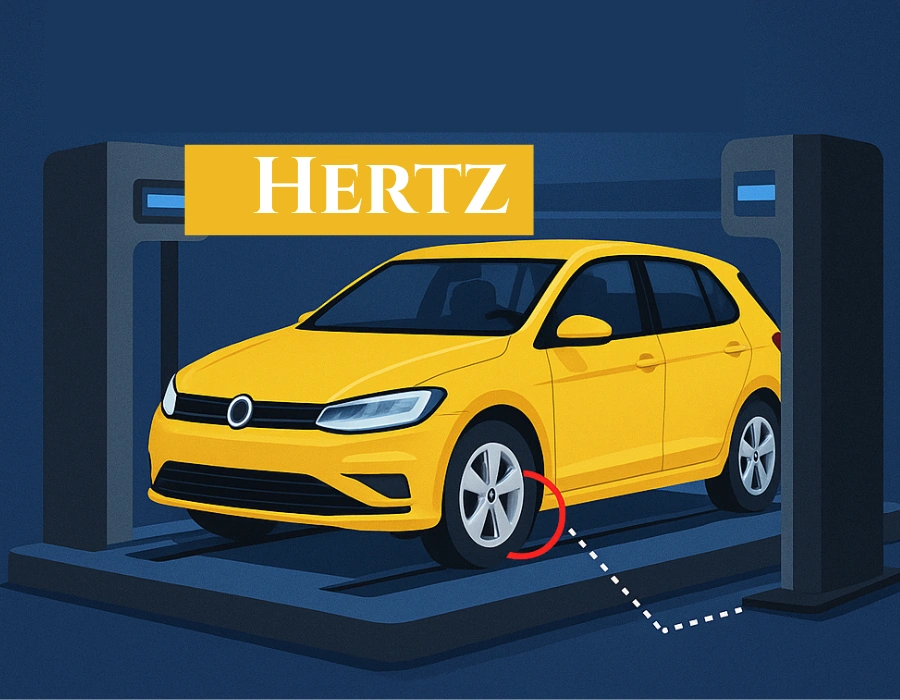Hertz is deploying AI-powered scanners to check rental cars for damage, aiming to speed up and “enhance” the experience. But a $440 scratch? That’s the new reality—according to one shocked customer.
Key Takeaways:
- AI scanners now check cars for damage at Hertz locations.
- Tech promises speed and transparency—but expect extra fees.
- One renter was charged $440 for a 1-inch wheel scrape.
- Critics question whether tech benefits customers or Hertz’s bottom line.
- Hertz plans to expand AI scans to 100 U.S. sites by end of 2025.
What’s New: AI Inspections Arrive at Hertz
Hertz is using artificial intelligence to modernize how rental car damage is detected—by removing humans from the process altogether.
The company has partnered with Israel-based startup UVeye to install AI-powered vehicle scanning stations at its rental locations. These scanners use advanced machine learning algorithms and high-resolution cameras to detect damage on a car’s body, tires, undercarriage, and glass surfaces before and after a customer rents a vehicle.
Hertz plans to roll out the system to 100 of its 1,600 U.S. airport locations by the end of 2025, starting with Hartsfield-Jackson Atlanta International Airport.
According to Hertz, this tech makes inspections faster, more frequent, and more accurate—eliminating subjective human judgment from the process. But for some customers, this convenience comes at a steep cost.
Real-Life Fallout: $440 for a Small Scratch
A report by The Drive tells the story of one unfortunate customer who returned a rental Volkswagen to the Atlanta airport and was immediately billed $440 for a one-inch scrape on the wheel.
Here’s how the charges broke down:
- $250 for the repair
- $125 processing fee
- $65 administrative fee
The customer, who rented through Hertz’s Thrifty brand, received the report minutes after returning the car. A quick, automated process—but one that left no room for discussion.
Worse, when he tried to dispute the charges, Hertz’s chatbot blocked access to human support, instead offering only an email contact with a 10-day response time—despite giving discounts for paying the bill early.
This situation is not isolated but raises questions about customer rights, dispute resolution, and the true cost of automation.
Expert Insight: Is AI Adding Transparency or Just Profit?
According to Hertz, the shift to AI is about “greater transparency, precision, and speed.” A company spokesperson explained:
“Digital vehicle inspections help deliver clear, detailed documentation more quickly, and create a more technology-enabled resolution process.”
They added that customers who cause damage should pay for it directly, rather than building that cost into rental prices for everyone.
However, consumer advocates aren’t convinced.
Elena Lytkina Botelho, co-author of The CEO Next Door and a business tech consultant, warns that AI-driven automation often comes at the expense of customer service and accountability:
“Without a human in the loop, you lose empathy—and in industries like car rentals, that’s critical. AI may find damage, but humans provide fairness.”
Is This Really Better for Renters?
On paper, yes. AI scanners could help prevent false damage claims, standardize processes, and protect both the company and customer.
But early reports suggest the system is skewed toward corporate convenience, not customer experience.
The lack of real-time human support, short dispute windows, and high administrative fees could leave renters feeling blindsided and powerless—even if the AI is technically accurate.
Why This Matters for You
If you plan to rent from Hertz—or any company adopting similar tech—you need to know the new rules of the game.
- Document everything: Take high-res photos of the car’s interior, exterior, and wheels—before and after your rental.
- Ask about inspection policies: Confirm how damage is assessed and what recourse you have.
- Watch for fees: Many charges are labeled “processing” or “admin,” but can still total hundreds of dollars.
- Know your contact points: Don’t rely solely on chatbots—save phone numbers and email addresses.
The Bigger Picture: AI in Customer Service
Hertz isn’t the only one embracing automation. Across industries, AI is taking over traditional customer-facing roles—from scanning receipts to handling disputes.
While this brings operational efficiency, it also shifts more burden onto consumers to document, defend, and navigate systems not built with empathy in mind.
In the end, AI may be here to help—but as this Hertz case shows, it doesn’t always mean help for you.
Conclusion
Hertz’s adoption of AI-powered damage scanners is a glimpse into the future of rentals—smart, streamlined, and deeply impersonal.
For renters, the lesson is clear: Technology is only transparent if you know how to protect yourself from it. The next time you rent a car, your smartphone camera might be your best insurance policy.
